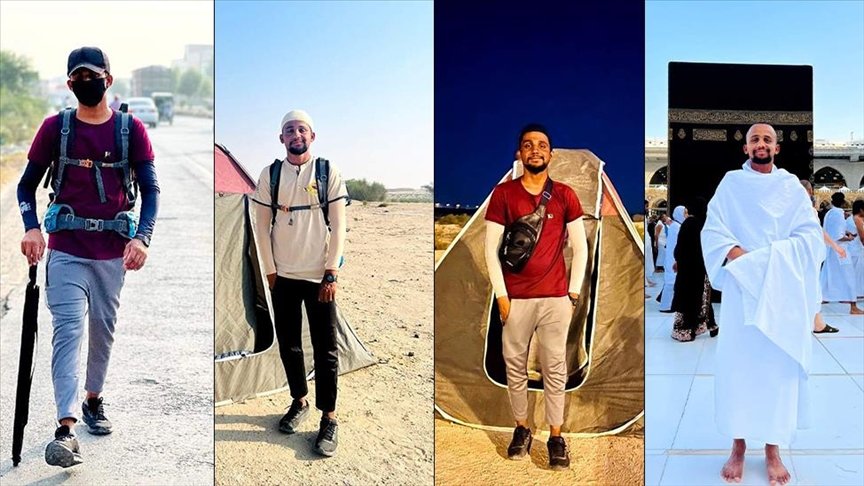Last year, Usman Arshad embarked on a long-awaited journey from his hometown in northeastern Pakistan on a sunny October day.
Undeterred by freezing winds and scorching heat, Arshad spent the next six months walking approximately 5,400 kilometers (3,350 miles) across four countries to fulfill his lifelong dream of performing Hajj, the annual pilgrimage considered the fifth and final pillar of Islam.
Arshad, 26, expressed his joy, stating, “I am very happy. It was my dream to walk all the way to the Kaaba,” referring to the sacred house of God built by the Prophet Ibrahim and his son Ismail. He believed that walking would bring him closer to God and spoke of the breathtaking natural beauty he encountered along the way, from stunning mountains to vast plains of sand.
During his journey, the university student documented his entire adventure on his social media accounts. His videos showcased him trekking along seemingly endless roads, carrying an umbrella in one hand and a large backpack slung over his shoulders, containing his clothes, tent, medicines, dry fruits, electronics, and travel documents.
As Arshad left his home in Okara, Pakistan’s Punjab province, on October 1 of the previous year, he received a warm send-off. Friends, family members, and well-wishers showered him with rose petals, while local news crews lined up for interviews. Initially, his father was against the idea and urged him to opt for the more convenient and safer option of air travel. However, Arshad was determined and eventually convinced his father, who also provided financial support for the journey, amounting to approximately 2 million Pakistani rupees (around $7,000).
This was not Arshad’s first long-distance trip, as he had previously walked from Okara to the China border in Pakistan’s northern region the year before. That journey, which he undertook as a walk for peace, covered a distance of approximately 1,270 kilometers (780 miles) in 34 days. Reflecting on his previous accomplishment, Arshad was confident that he could undertake the entire journey to Mecca for Hajj.
Arshad spent around 10 months meticulously planning his trip. He researched routes, met with government and embassy officials to discuss his plans, and prepared himself for the journey ahead. Starting from Okara, he passed through 15 cities in Pakistan before reaching the Taftan border with Iran in the southwestern province of Balochistan.
Initially, Arshad intended to travel from Iran to Iraq, Kuwait, and then Saudi Arabia. However, due to visa complications in Iraq and Kuwait, he altered his route and headed to the UAE from Iran. The journey presented its share of hardships, including scorching heat that posed a walking challenge and frigid winds that made progress nearly impossible.
Arshad vividly recalled the freezing conditions at a place in Iran, where the chilly winds drained the color from his face. He also encountered stretches of hundreds of kilometers with no signs of human presence.
In Iran, for example, he would go without encountering anyone for 200-250 kilometers (125-155 miles), making it difficult to find food or a place to stay.
While in Iran, Arshad spent 45 days, traversing eight cities and occasionally finding respite in hotels to recharge his electronics, shower, and wash his clothes. In more remote regions, he relied on his tent for shelter.
After traveling through the vast stretches of desert, covering 400 kilometers (250 miles) from Abu Dhabi to Saudi Arabia, Arshad encountered several Pakistani truck drivers who offered him food and water to help him overcome the challenges of the harsh terrain.
On March 13, Arshad entered Saudi Arabia through the Batha border and passed through seven cities until he finally arrived in Mecca.
Arshad plans to return home on July 14 and resume his studies, which were put on hold for the past nine months.
Looking ahead, Arshad envisions himself as a travel vlogger, sharing his adventures with the world.
Reflecting on his journey, Arshad expressed deep gratitude for the kindness he received from strangers along the way. He recalled a particularly memorable incident in a cold and desolate area in Iran, where he had just settled down for the night in his tent when a compassionate man approached him and invited him to his home.
“He lit a fire for me and brought me food. He was so kind. I have many, many stories like these to share,” Arshad shared, emphasizing the countless acts of generosity he encountered during his pilgrimage.


